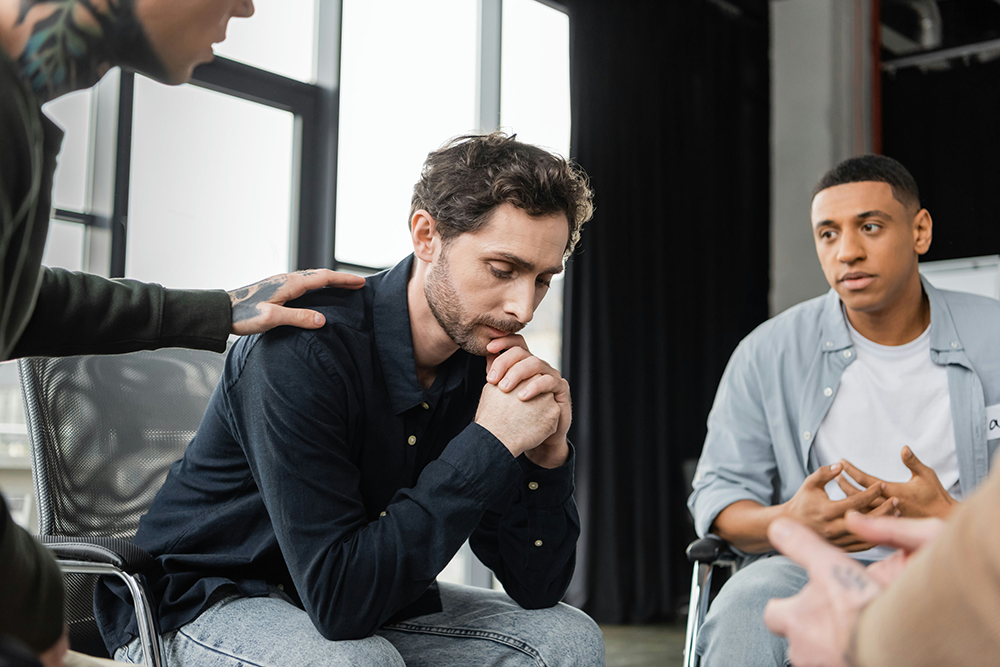Addiction group therapy plays a crucial role in the recovery journey by providing a supportive space where individuals can share their experiences, gain coping strategies, and build resilience. With carefully curated addiction group therapy topics, these sessions foster healing and personal growth, addressing both psychological and emotional aspects of addiction. Topics aim to improve emotional well-being and enhance interpersonal skills, empowering individuals to navigate the challenges of recovery.
Our group therapy offers ongoing support for individuals facing drug or alcohol addiction. In these settings, members come together with a shared goal of overcoming addiction, guided by licensed therapists who facilitate discussions, identify individual challenges, and ensure personalized recovery needs are met. Through these discussions and shared experiences, individuals connect with others who understand their struggles, creating a judgment-free space for healing.
Common Group Topics for Addiction Therapy
Addiction group therapy in New Jersey covers various essential topics that help individuals in recovery build resilience and maintain sobriety. Here are some common group topics often addressed in these sessions:
Understanding and identifying personal triggers, situations, emotions, or environments that prompt substance use is crucial in addiction therapy. By discussing these triggers, individuals can develop strategies to manage cravings and reduce the risk of relapse. Sharing experiences within the group fosters a sense of community and mutual support.
Relapse is a common challenge in addiction recovery. Group therapy sessions often focus on developing personalized relapse prevention plans, which include recognizing early warning signs, establishing coping mechanisms, and creating a supportive network. These discussions empower individuals to take proactive steps in maintaining their sobriety.
Effective coping strategies are essential for managing stress, anxiety, and other emotions that may lead to substance use. Group therapy provides a platform to explore various techniques such as mindfulness, deep breathing, and cognitive reframing. Learning from others’ experiences enriches one’s toolkit for handling life’s challenges.
Addiction often strains familial and social relationships. Therapy sessions may explore communication patterns, establish healthy boundaries, and help rebuild trust. Addressing these issues within the group context allows individuals to gain insights and support from peers facing similar challenges.
Many individuals in recovery also deal with mental health disorders such as depression or anxiety. Group therapy can address these co-occurring issues by providing psychoeducation, sharing coping strategies, and fostering a holistic approach to healing. This integrated treatment approach enhances overall well-being.
Group Therapy Activities for Recovery
Group therapy activities in New Jersey are designed to engage individuals in recovery, helping them develop new skills and coping strategies. Here are some common group therapy activities that support recovery:
Role-playing exercises allow individuals to practice responses to real-life challenges, such as triggers or peer pressure. These activities build confidence, prepare participants for tough situations, and promote empathy by encouraging different perspectives. This hands-on approach helps individuals feel more equipped to handle similar situations in their everyday lives.
Mindfulness activities, such as guided meditations and breathing exercises, help individuals stay present and manage cravings. Regular practice enhances emotional regulation, reduces impulsivity, and fosters emotional resilience. By cultivating a deeper awareness of their thoughts and feelings, individuals can better control their reactions to stress.
Psychoeducational sessions provide key information on addiction and recovery, helping participants understand its impact on the brain and their personal experiences. Topics like addiction’s neurobiology and the stages of change empower individuals to approach recovery with greater clarity. This knowledge builds a foundation for lasting, sustainable change in their behavior.
Sharing circles offer a safe space for individuals to express thoughts and feelings without judgment, fostering empathy and connection. These sessions remind participants they are not alone in their struggles, promoting mutual support. They create a sense of belonging, which is crucial for emotional healing and long-term recovery.
Journaling encourages self-reflection and emotional expression. Participants write about their experiences, challenges, and progress, which can facilitate group discussion and provide insights into personal growth. Writing can also be a powerful tool for processing emotions and tracking recovery milestones.
Art therapy provides an outlet for emotional expression through creative activities like drawing, painting, or sculpting. Participants use their art to express feelings that may be difficult to verbalize. This form of therapy fosters healing by allowing individuals to explore their emotions in a non-verbal way and provides a sense of accomplishment and self-discovery.
CBT exercises focus on identifying and challenging negative thought patterns and replacing them with healthier, more balanced thoughts. Activities in this approach often include thought records, cognitive restructuring, and reframing techniques. These exercises empower individuals to change their mindset, reduce self-destructive behaviors, and adopt healthier ways of thinking.
How Do Group Therapy Activities Support Recovery?
Group therapy activities are designed to reinforce the therapeutic process by:
Activities like journaling and mindfulness encourage individuals to reflect on their thoughts and emotions, providing valuable insights into their behaviors and reactions. This self-awareness helps them recognize patterns and triggers, allowing for more intentional decision-making as they navigate their recovery journey.
Role-playing and psychoeducation equip participants with practical tools to handle stress, cravings, and difficult emotions. These activities provide a safe space to practice and refine coping strategies, empowering individuals to deal with life’s challenges more effectively and maintain their progress in recovery.
Sharing circles and group discussions foster a sense of community and belonging, helping individuals feel understood and supported by others who are going through similar experiences. This connection reduces feelings of isolation, making recovery feel more manageable and reinforcing the importance of mutual support.
Group therapy provides a space where participants can set personal goals and receive constructive feedback from peers. This accountability helps individuals stay focused on their recovery, motivating them to take responsibility for their progress and remain committed to their goals.
Addressing underlying issues such as trauma, guilt, or shame within the group context helps individuals process these emotions in a safe, supportive environment. By working through these difficult feelings, individuals can begin to heal and move forward with greater emotional resilience, improving their overall well-being and recovery.
Group Therapy at Clear Direction Recovery in New Jersey
Clear Direction Recovery in New Jersey offers personalized group therapy designed to address each participant’s unique needs. Using evidence-based therapies such as CBT and mindfulness, we help individuals manage cravings, prevent relapse, and develop emotional resilience.
Our sessions combine psychoeducation with practical skill-building to equip participants with the tools necessary for stress management, effective communication, and emotional regulation, thereby ensuring long-term success in recovery.
Peer support is central to our approach, fostering a sense of community and accountability. Group members share experiences and support one another, helping individuals stay motivated and committed to achieving lasting sobriety. Contact us today!
FAQ
Group sizes typically range from 6 to 12 participants. This size allows for meaningful interaction while maintaining an intimate and supportive environment.
Group therapy sessions typically last between 60 to 90 minutes. This duration allows enough time for meaningful discussion, activities, and sharing while ensuring the session is not too overwhelming for participants.
Yes, confidentiality is a cornerstone of group therapy. Participants are expected to respect each other’s privacy, creating a safe space for open sharing.
Participation is encouraged but not mandatory. Individuals are welcome to listen and reflect without sharing if they are not comfortable.
- Be Open: Approach the session with a willingness to listen and share.
- Be Punctual: Arriving on time shows respect for the group and the process.
- Be Honest: Authenticity fosters trust and meaningful connections.
- Be Respectful: Honor the confidentiality and perspectives of fellow group members.
If you need additional support outside of the group, reach out to your therapist, counselor, or support network. Many addiction treatment centers also offer helplines or after-hours support for participants in need.
It’s normal to feel uneasy at first. You are not required to share if you’re not ready. Over time, as trust develops within the group, you may feel more comfortable participating at your own pace. Feel free to let the group leader know if you need additional support.
By embracing these principles, individuals can maximize the benefits of group therapy and contribute to a positive and supportive group dynamic.



